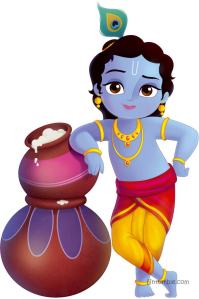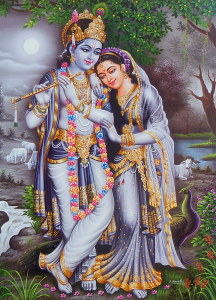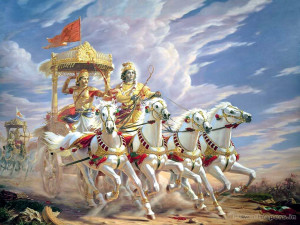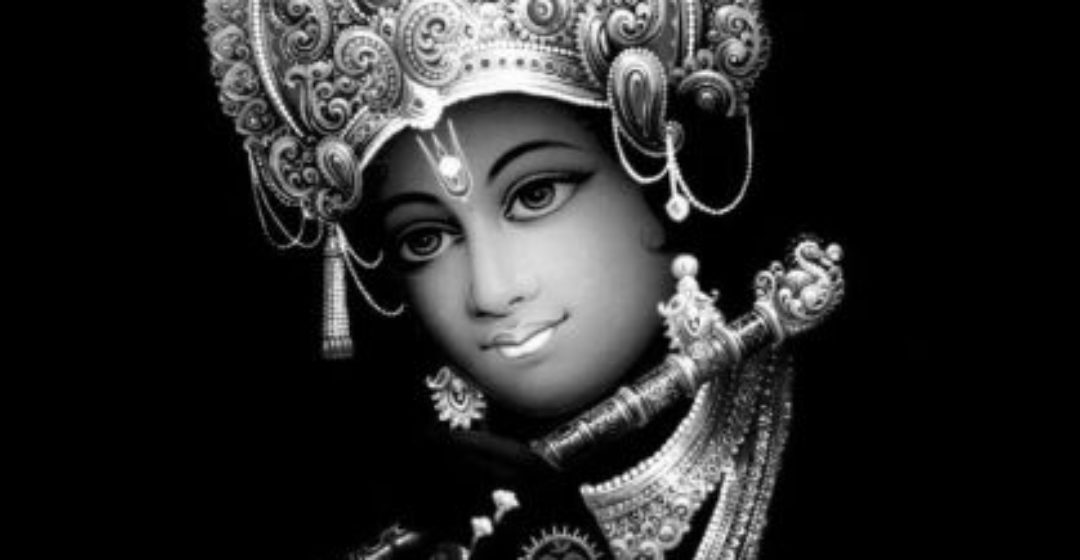The inspiration of this post comes from someone who recently told me that I was misplaced to be so enamored by Shiva because he is ‘stagnant, feared and easily pleased’. I was encouraged to look at Krishna, the more emotional and ‘sarv gun sampann’ (all qualities included) deity.
Well, I have looked at Krishna and then looked at him again. I admit that I am enamored by Krishna, albeit in one dimension. He was the master manipulator.
I started looking at the various phases of his fabled life that we know so well. But before we delve into this, I should mention here that we are analyzing the character of Krishna. There is no attempt to hurt the sentiments of anyone. Neither is this an analysis of Krishna, the God!
Krishna Stealing Butter

It all started with the women of Vrindavan. Krishna loved to eat freshly churned butter, like most kids did. The Yadava clan to which Krishna belonged was of cowherds and so milk was in abundance. The excess fat from milk was churned into butter each day by the women and the children tried to get their hands on to it. Krishna, the charmer, smiled his way as he stole handfuls of butter for himself and his friends. We, who consider him God, look at this act as a naughty act by a young enchanting toddler. Did any of the other children receive such endearing reprieves when they mischievous? Krishna basically used his charm to steal butter that was otherwise meant for the marketplace.
Krishna and the Gopis
Krishna grew up to be a free, easy-going and nonchalant teen. Gopi’s (cow herding girls in the Yadava clan) were mesmerized by this handsome youth. Krishna took a lot of advantage of this attention. When these gopis bathed in the river, their clothes were stolen. There is also talk of raasleela, which would loosely translate to flirting in our parlance. We rationalize this stage as the normal curiosity of a teenager with regards to the opposite sex and thus we have ‘natkhat kanhaiya’ (naughty Krishna).

Krishna showed particular interest in Radha, an older woman who was abandoned when it was time to leave the village to slay the evil king and uncle, Kansa. If someone did that today, we would probably say he used her, flirted with her and dumped her!
Not much is written about the time frame after Krishna killed Kansa (his evil uncle who was king) and when he started actively getting involved in the politics surrounding Hastinapur, the capital of the largest northern kingdom in India in those times.
Did Krishna Try and Avert War?
It is said that Krishna tried his very best to avoid the war that took place in Kurukshetra and only when Duryodhana (or rather Suyodhana, as he was named by his mother) refused to concede even 5 villages to his cousin brothers, the Pandavas did war become unavoidable.
Few are aware of the side-story in which Krishna asks Sahadeva, the fifth Pandava (known to be adept in the art of astrology), whether Suyodhana would accept the 5-village offer or not. Only after Krishna was convinced that Suyodhana would not accept the offer did he carry out the charade of going ahead with the 5-village offer. Only then was the offer taken to the Hastinapur court. Would Krishna have taken that offer to Suyodhana if he felt it would have been accepted?
Come to think of it, Krishna was a close friend of Draupadi’s. Some even say that Draupadi secretly wanted to marry Krishna but the kingmaker felt it more strategic to have her closest friend marry the one he wanted to see on the throne of Hastinapur. Why would he want to avoid war when Draupadi had sworn revenge against the Kuravas (Suyodhana and his 99 brothers) for the insult meted out to her in court?
The 5-village offer was probably a show put up for all to show how the Pandavas were the righteous people trying their level best to arrive at a compromise. It was important to keep up this farce to attain the goodwill of the people and win the support of neighboring kingdoms too.
Literally Speaking the Gita was Motivation to Kill

The reason why the long lecture of Bhagwat Gita was started was to motivate Arjun, the great Pandava warrior, to have the courage to kill his loved ones since they stand on the side of adharma (I honestly have no way of translating this in English. Dharma is what you consider your ‘personal’ duty). Looking at the tirade at a superficial level, it is a manipulation of words to ‘pump up’ Arjun with adrenaline to ensure that he does not back out from the war. And if you have read the Gita in some form or another, you will know that there are more than a few methods of convincing that were used. The three strategies that come to mind immediately are:
Gyan Yog / logic or knowledge – We are all souls, and no one really dies and so you are not killing anyone. Proof anyone?
Karma Yog / duty – Do your duty and since you belong to the warrior clan (kshtriya varna) you must fight. Notwithstanding who a warrior should fight and why and how? Should not that be based on the warrior’s ‘personal’ dharma? Why should it be based on what Krishna says to him?
Bhakti Yog / unquestioning faith – I am the all-mighty and all-consuming and therefore, do as I say and leave the rest to me.
He also used fear as a tactic by creating the viraat roop (larger than life image of himself) and instilling fear in the already sweating Arjun.
Don’t take me wrong here! I have great respect for some of the theories mentioned in the Gita. However, what I am analyzing here is the character of Krishna and not critiquing the theories mentioned in the Bhagwat Gita at all!
During the Mahabharata War
Krishna had a key role to play in most of the foul play that ensued in the battle of Mahabharata.
Whether it was putting Shikhandi in front of Arjun to be able to kill Bhishma, making sure Suyodhana does not appear completely naked in front of his mother so that his body does not become like stone in all places, or ensuring Karna knew he was Kunti’s son (and therefore a Pandava) before the war to debilitate his will, Krishna was the key advisor throughout this journey. He definitely knew how to influence minds, bend people to his will and use others insecurity to get his will.
War was Inevitable, they Say
Many wars have been justified by saying that it was inevitable and that things were getting too bad. It just had to be done! It is always the perspective of the victor that stands the test of time since all other arguments are demolished. All facts that support those who finally won the war are retained and passed into posterity.
Despite reading about this story many times from various perspectives, I can’t get a grip on many things….
Why should Yudhishtar have been the crown prince?
Not many question Yudhistar’s (the eldest Pandav) claim to the throne. The Pandavas, even though they are called that, were not biological sons of Pandu. Scriptures tell us that they were sons begotten by a mantra that Kunti knew. The five Pandavas were sons of gods – Dharma, Vayu, Indra, and the Ashwin twins (did not know twin brothers could copulate with a woman so that she gave birth to twins again. It must have been an interesting threesome!). At least Suyodhana was the biological son of Dhritrashtra, the then king of Hastinapur.
Even more ironical facts come to surface if we go a few generations before this. In an empire that made a huge hue and cry about the importance of caste, the lineage of the entire royal household came from a ‘bastard’. Dhritrashtra and Pandu, both were biological sons of Vyaas (a bastard son of Satyavati, queen regent of Hastinapur and a well-feared and respected sage). The only person alive that could have produced legitimate offspring of the Kuru clan was Bhishma, who had vowed to remain celibate all his life. Which is why the whole chaos started, I guess!
What was wrong with Hastinapur / Northern India that it needed cleansing?
I understand that there were two factions of people with regards to the claim to the throne after Dhritrashtra – one that wanted Suyodhana on the throne and the other that wanted Yudhishtar. Given the convoluted family history and tree, it may be tough to go with one or another.
War, they say is necessary at times when evil gets out of hand. What evil pervaded Northern India during these times that the country had to be cleansed? And why do we have nothing said about what changes the Pandavas made in society after they came to power? In fact, what I do know about them is that they burnt down an entire forest (khandavprast) in order to carve out their kingdom; something which would definitely have been protested against today!
At the end of it all, it seems that the war was required to make sure that the Pandavas ruled Northern India. Who wanted this more than anything – Krishna! And he achieved it, appeased his insulted best friend Draupadi, satisfied his aunt Kunti (mother of the Pandavas), and made sure that he remained an important individual in the politics of the times as kingmaker!
A Word of Caution
Despite this analysis of the character of Krishna, I am completely mesmerized by his flexibility and prowess. The main reason why Krishna has remained relevant through the ages is because he teaches how to survive. Today when public opinion, material success, social standing, and society matter a lot, this charmer, manipulator, and yet unattached individual is surely something to look up to!
As for me personally, it will always be that ‘easily pleased loner’ who sits on Kailash Parbat and has a following of ghosts, dogs, pariahs and asuras and who does not give a damn! Shiva will always be my Isht Dev (personal favorite God).
Who is your favorite God among all the Hindu deities and why? Would love to hear about it.


What a different interpretation! Loved going through the whole write up.
half way in, was not really sure where you are going with this..had a smirk all the way though.
decoding the convoluted mind of well revered character. Well done!!!
Totally agree with the ‘character’ bit. And in today’s climate, this mind should definitely be well revered too!!